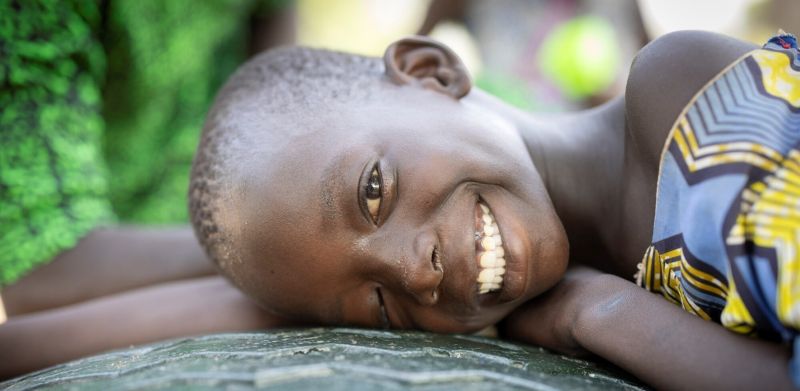Uganda, also known as the “Pearl of Africa,” is a landlocked country in eastern Africa.
It’s home to an abundance of natural beauty, diverse wildlife and a rich cultural heritage. Unfortunately, life can be tough for children here as families often struggle to access basics like clean water, healthcare, adequate nutrition and education.
ChildFund has worked in Uganda since 1980. Our programs, operated through nine local partner organizations, center around helping children grow up …
Healthy
ChildFund Uganda focuses on keeping children healthy through community-level programs supported by our local partners. The Responsive & Protective Parenting program connects children aged 0-5 to critical health services and supports families to provide for their children’s health needs, while the Nutritional Assessment Counseling and Support (NACS) program screens for malnutrition and teaches parents how to grow and prepare nutritious food. Children aged 6-14 receive similar health services, along with Vitamin A supplementation, deworming and access to clean water. Finally, adolescents ages 15 and up participate in age-appropriate health programs such as menstrual hygiene education.
Educated
ChildFund Uganda enhances children's education by helping create child-friendly learning environments, promoting literacy and numeracy skills, and strengthening school infrastructure. For children aged 0-5 years, we encourage caregivers to get involved in early childhood development (ECD), inspiring nearly 4,000 parents each year to support ECD centers across six local partners. Infrastructure improvements, such as renovations and the provision of furniture and learning materials, help ensure a conducive learning environment for our enrolled students. For children aged 6-14 years, the education program focuses on school attendance, academic performance and child protection through the Education for Protection and Well-being (EPW) Project, which involves counseling and collaboration among parents, teachers and community members to reduce dropout rates and prevent school-based violence.
Skilled
Young people in Uganda face significant challenges in their transition to adulthood, such as high dropout and unemployment rates. ChildFund works to support youth by providing access to valuable vocational and entrepreneurial skills. Collaborating with eight implementing partners across various regions, we offer career guidance and counseling to more than 3,000 out-of-school youth annually, with more than 700 receiving vocational training in diverse fields like carpentry, hairdressing and motor vehicle mechanics. Our programs also train peer educators and encourage community civic engagement and leadership. For example, our Resilient Livelihoods project trains young farmers in climate-resilient agricultural methods and equips youth with vocational and entrepreneurial skills while also strengthening the local government’s ability to respond to disaster risks.
Safe
We ensure the safety of children through our child protection and advocacy programs, which use evidence-based approaches to reduce rates of violence and abuse. Community-led child protection programming strengthens existing local structures to help prevent, address and report violence, and our advocacy efforts focus on promoting policies and increasing budget allocations for child protection at various levels of government.
 Children in our Education and Protection for Well-being program read our comic book on child protection.
Children in our Education and Protection for Well-being program read our comic book on child protection.
 Six-year-old Robert and his dad celebrate the gift of a wheelchair they received from ChildFund’s local partner, Partners for Children Worldwide.
Six-year-old Robert and his dad celebrate the gift of a wheelchair they received from ChildFund’s local partner, Partners for Children Worldwide.
 Mary, 12, speaks at ChildFund’s Child Rights Club at her school, where she and her friends learn about their right to education, protection from violence and more.
Mary, 12, speaks at ChildFund’s Child Rights Club at her school, where she and her friends learn about their right to education, protection from violence and more.
 All smiles at a ChildFund-supported early childhood development center in Katakwi District.
All smiles at a ChildFund-supported early childhood development center in Katakwi District.
 Child survivors of war in South Sudan play at our Child-Friendly Space in Uganda’s Palorinya Refugee Settlement.
Child survivors of war in South Sudan play at our Child-Friendly Space in Uganda’s Palorinya Refugee Settlement.
 Children celebrate the unveiling of a new borehole built by ChildFund.
Children celebrate the unveiling of a new borehole built by ChildFund.

